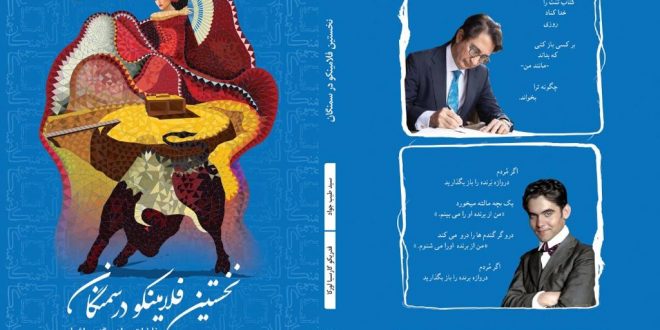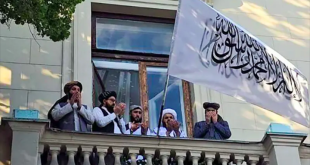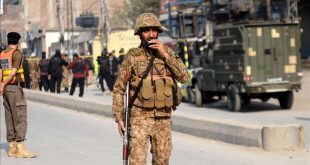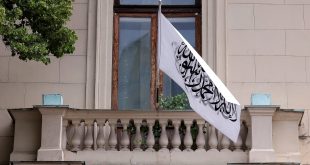By Gulabdudin Sukhanwar
The First Flamenco in Samangan is a new publication and comprehensive coverage that includes memories, poetry, literature, art, culture, and history. A book that offers a cultural narrative of Afghanistan and its heritage and reminds us, the Afghans, to go back to our roots, re-read our history, and learn from the values and diversities that Afghanistan used to have.
Said Tayeb Jawad authored a book that not only highlighted Afghanistan’s diversity and its rich literature and poetry but also takes us on an artistic journey of Spanish literature and poetry. By reading each part, the reader can experience different streets and valleys of Afghanistan and learn about art, culture, and traditions from Spain.
It is a narrative from the old Kabul – a city that was a centre for culture and art and home for harmony, respect, and tolerance so that Muslims’ mosques and Jewish synagogue were open side by side. A city of art and poetry, theatres, nightclubs, and cinemas where family and friends enjoyed sharing cultural events and socialized. A Kabul street that was safe to walk along and enjoy the beauty of its landscape and architecture. “People would go for afternoon walks around the city park in the Shahr Now District. The walk would start at the Haji Yaqub Square, where Kabul’s best restaurants and tavern, Shahr Gholgholeh, meaning “The city of Screams,” was located. … taking that walk, you would pass by Club No. 9, one of Kabul’s to- nightclubs.”

The First Flamenco in Samangan designs a cultural map of Kabul where we see the cinemas, nightclubs, restaurants, gardens, and live concerts, which was meant to be a friendly, safe, and welcoming destination for tourists. “Once you passed by the Jewish Synagogue and a few restaurants at the end of florist’s ally, you reached the Zeinab Cinema, one of the most fashionable and prestigious cinemas in Kabul, where blue-blooded families would often go to sit in the boxes to see each other and to be seen watching American movies that had been skilfully dubbed into Farsi in Iran.”
We read about the city of screams – Shahre Gholghole but that was once full of laugher, harmony, and joy. In total contrast, today’s Kabul is full of mourning and grief and one of the most wounded and dangerous capitals in the world that suffers explosions, bombs, and conflicts on an everyday basis. In fact, last month, the Afghan government destroyed one of the cinemas, Cinema park in the Shahr Now.
From Kabul, the book also shares Jawad’s early memories from his time at school and how young people had access to the libraries and world literature. “I also had access to the library of Lycee Istiqlal, which contained a good collection of literary publications and French books, including the magazine Reve de Pari. Each of these was a window into contemporary Persian and French literature.”
Kandahar is another city that features prominently in this memoir: “Kandahar was a vibrant and cultured city in those days, with mild-mannered people. The city smelled of pomegranate and fried fish. Every weekend young people rode bicycles to the suburbs, to Arghandab, Sanziri, Shaha Agha, and Daleh Reservoir to picnic and play cards.”
The book represents an incredible narrative from Samangan that brings back the excitement of a love story of the mythical hero Rustam with the Samangan princess Tahmina- a reflection from the Persian epic Ferdowsi’s Shahnama, the book of the kings. “The realm of the little Valley of King Samangan was sandwiched between the two great empires of that time: the Truran Empire and its shrewd king, and Afrasiab and the Persian Empire with its mighty King of Kings, Kaikavus. Rustam paid the price of the rivalry between those two great emperors when Kaikavus forced him to fight his son, Sohrab, and Afrasiab did not allow the magic potion of medicine to be delivered on time, which cost Sohrab’s life.” By sharing this story that Rustam did not recognize his son and killed him in hand-to-hand battle, he concludes that even today the Afghan are keen to battle and kill each other. … having experienced our civil war, I may conclude that we have a special talent, remorsefully, when it comes to fighting and shedding blood.”
In addition to giving us a report of the Persian epic and love story and old memories from different parts of Afghanistan, the book introduces us to the legendary Spanish poet Federico Garcia Lorca.
Reviewing six collections of Federico Garcia Lorca’s poetry, and translating a dozen beautiful, selected poems, the writer offers us a great image of the famous Spanish poet and his work. This is a grand narrative that opens a new window for understanding Spanish poetry and culture. The power of his writing and the way he narrates the characters and describes the country’s cultural details is incredibly exciting and inspiring.
Tamarit Divan is one of six collections that is reviewed in this book and Jawad explains why he chose it: he calls it his favourite. “This is my favourite poetry collection by Lorca, since Divan del tramarit contains poems evocative of the delicate and exotic world of Arabic poetry which is, in turn, intertwined with Farsi literature. … the poems of Divan del tamarit display a more controlled set of feelings, carefully working through the complexities of the association of love, death and sex.”
Bullfighting is discussed both in Lorca’s poetry and as traditionally a game rooted in medieval Spain. “Inseparable from the heart and soul of Andalusia, bullfighting imagery is present throughout Garcia Lorca’s poetry. … Bullfighting, which its rich cultural history, has become heavy with symbolism. It is a visual spectacle enhanced by the bright colors of the moderator’s clothing, the red cape, and the bull’s blood. Moderator and bull are engaged in a test of wits and skill on the one hand, and strength and stamina on the other.”
While I am not a fan of bullfighting, I am amazed by such a comprehensive presentation and the power of words to help us imagine the danger and excitement of the game by reading about it in this way.
Among his many other achievements, Ambassador Jawad was awarded the 2019 Diplomat of the year award bythe Diplomat Magazine for his diplomatic and political engagements. I am certain that The First Flamenco in Samangan puts him amongst the best writers of the year too.
I conclude this review with a quote expressing the author’s love for poetry and literature. “if law and politics have been my professional commitments and means of my sustenance, the delight of my life has come from poetry and literature.”
Tipsy Haiku
Words bloom
In your wild laughter.
Love breeds
In your twinkling eyes.
The Embrace
My arms are here
to hold you high
when you want to soar.
Pick you up
when you are down.
Wrap around you
when you are cold.
First Anniversary
The girl passes across my brow.
Oh, that ancient feeling!
What use to me, I ask,
are paper, verse, and ink?
To me you r flesh is
red lily, cool creed.
Dark girl of the full moon.
What do you want of my desire?
Gulabdudin Sukhanwar, a writer and public speaker originally from Afghanistan, now lives in Norway. He works at the House of Literature Trondheim, where he led the Literature for Inclusion initiative. Sukhanwar participated as an academic guest (2016-2017) at the Norwegian University of Science and Technology NTNU, where he studied English literature, he pursued his education in cultural heritage studies at NTNU. Currently, he is also a member of the academic committee for literature at the Arts Council Norway.
 Afghanistan Times
Afghanistan Times




